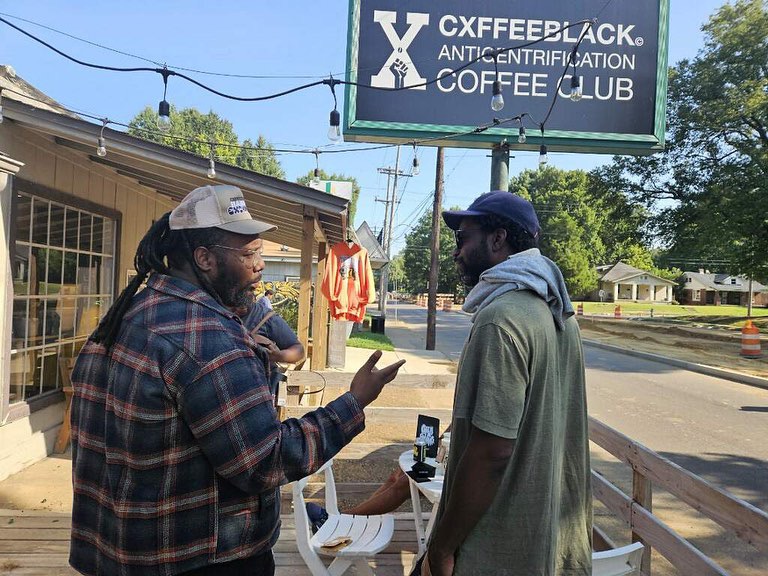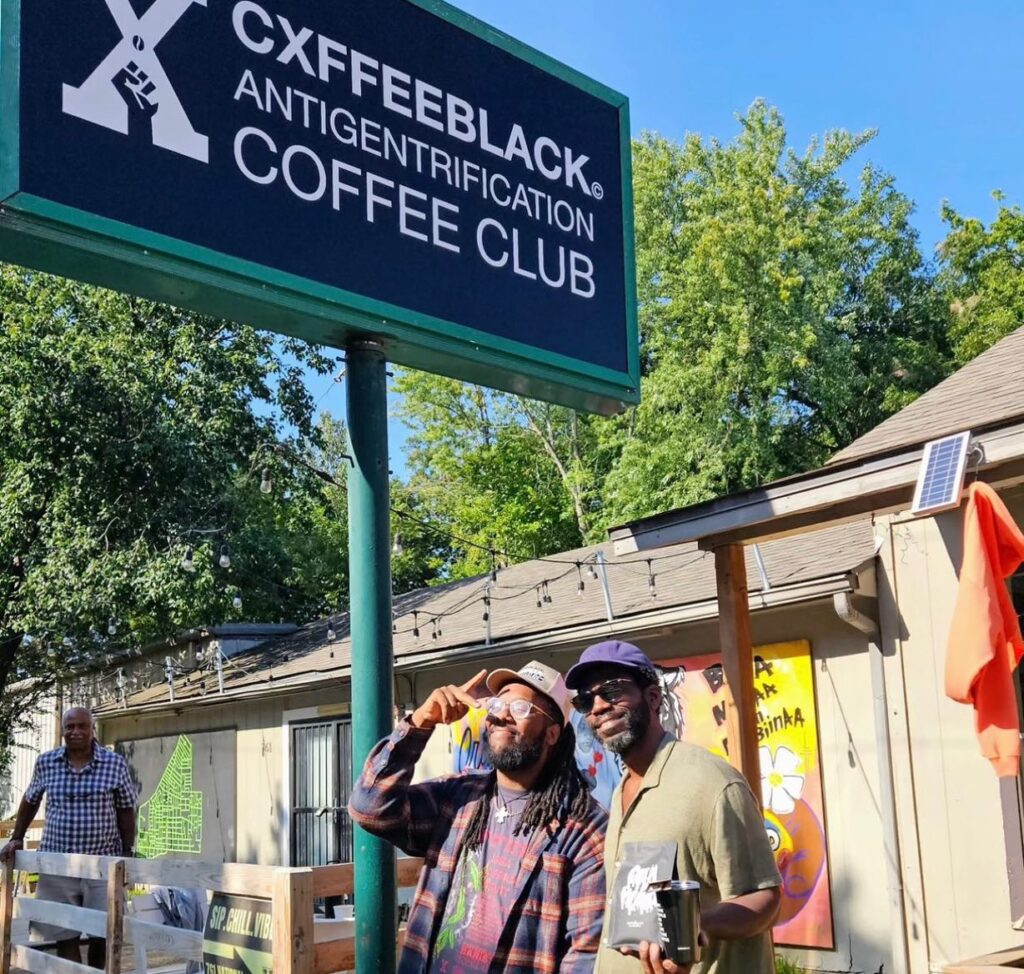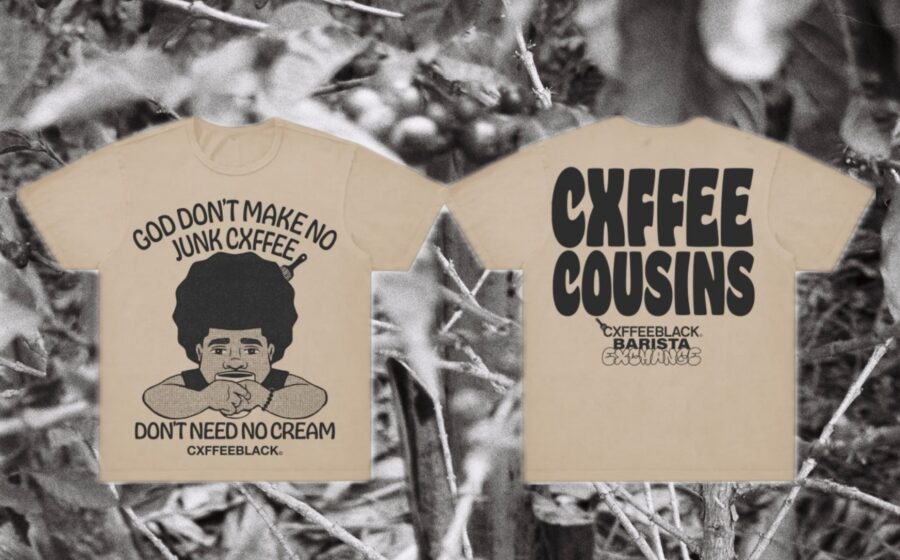On Tuesday, Memphis-based coffee and lifestyle brand Cxffeeblack announced they will partner with COMOCO Cotton to release an exclusive t-shirt highlighting “Black ownership, cultural restoration, and sustainable innovation.”
The project brings together two companies focusing on working with Black suppliers throughout the supply chain to create economic equity in communities where value has historically been stolen and commodified.
“The goal is to spread awareness about the importance of creating Black ownership in traditional industries that are neocolonial in nature and have a lot of trauma attached to them,” said Cxffeeblack co-founder Bartholomew Jones in an interview with Fresh Cup. “It is using ownership, creativity, and artistry to reclaim and reimagine our own dignity.”

COMOCO Cotton aims to create an all-Black cotton supply chain. They produce t-shirts made with “100% Certified Black-grown cotton,” according to their website. The website further notes the historic inequalities laden in agriculture and textiles, specifically with its ties to enslaved labor: “Black farmers represent less than 2% of the 3.4 million farmers in the U.S., and 96% of U.S. agricultural land ownership is white-owned,” the website says.
Founded in 2019, Cxffeeblack, co-founded by Jones and his wife, Renata Henderson, has worked to create an all-Black coffee supply chain. Along with sourcing and selling coffee, the duo runs a coffee hub in Memphis called the Anti-Gentrification Cxffee Club, created a barista exchange program between Black American and African baristas, and produced an award-winning documentary, “Cxffeeblack to Africa,” documenting the first leg of the barista exchange program.
“Coffee and cotton, long tied to Black labor and exploitation, carry deep cultural significance as symbols of resilience and creativity,” a press release announcing the partnership states. “Now, these industries are being reimagined through a groundbreaking collaboration between Cxffeeblack and COMOCO Cotton.”
Jones said he met COMOCO Cotton founder Stephen Satterfield when he and his family visited Memphis and came to Cxffeeblack’s coffee hub in Memphis called the Anti-Gentrification Cxffee Club. Jones said he connected with Satterfield, founder of Whetstone Media and host of the popular Netflix documentary “High on the Hog,” over the Cxffeeblack’s supply chain work.
“Reclamation has been at the center of my work for nearly two decades,” Satterfield wrote in a LinkedIn post. “I feel like its just beginning as I begin to align this work in the textile sector.”
“How do we actually provide generational wealth and liberation? We have to start owning land. We have to start owning a supply chain,” said Jones. “This is big work in and of itself to push forward.”
Cxffeeblack’s signature coffee blend, Guji Mane, will be used to dye the t-shirts for the collaboration. On the front will say, “God Don’t Make No Junk Cxffee, Don’t Need More Cream,” a riff on a phrase Jones said was on a shirt his grandmother gave him, now a “declaration of self-worth and cultural pride.”
“By using Guji Mane coffee to naturally dye the cotton, this collaboration reframes coffee not as a gentrified luxury but as a sacred commodity of African ingenuity,” the press release states. “Similarly, cotton—once a symbol of slavery and sharecropping—becomes a material of pride, ethically sourced from Black farmers.
The t-shirt release dovetails into Cxffeeblack’s ongoing Revenue Share Community Investment Round: 30 t-shirts will be for new investors, while the other 30 will be saved for people who have previously contributed and increase their investment.
Reclaiming the supply chain
Jones said that Cxffeblack’s model — focusing on Black producers from start to finish — came about “organically,” even though the work to implement these ideas took years to make happen.
He’s seeing more of a need to create partnerships outside of “a system where someone can simply turn the faucet off/on politically,” especially as brands fall short or pull back their diversity, equity, and inclusion policies.

Jones said Black creativity and culture are often the foundation of many businesses, but rarely do the people creating culture own the means of production — this is a chance to invest “in a future where Black ownership is not the exception—it’s the standard,” Satterfield said in the press release.
“If we’re building our liberation models off of supply chains, off of land, off of crops and processes and factories that are owned by people who historically benefited from our oppression, then, at some point, those people can just decide no longer to do business with us,” he said. “It’s like, well, how do we begin to find people who do want to do business with us and center the basis of what we produce in those communities?”
A lot has built up to this moment, said Jones, but he also looks at this collaboration as representative of how he’d like to think about business moving forward. For example, he’s looking at working with an all-Black supply chain of cocoa growers in Trinidad.
“What we’ve seen is years and years of looking at family histories, looking at shared trauma, looking at solutions across multiple industries, whether it’s food or coffee or chocolate or cotton, and then deciding, ‘Okay, now we’re going to be very specific — intentional — about launching this product as a symbolic representation of what we do,’ and then begin to transition all of our business to these kinds of models and supply chains,” he said.
“How do we begin to reclaim our rights to these crops, to the fruit they can produce — not just literally, but also economically?” he asks.
You can pre-order the t-shirt here and learn more about Cxffeeblack’s equity campaign here.
















